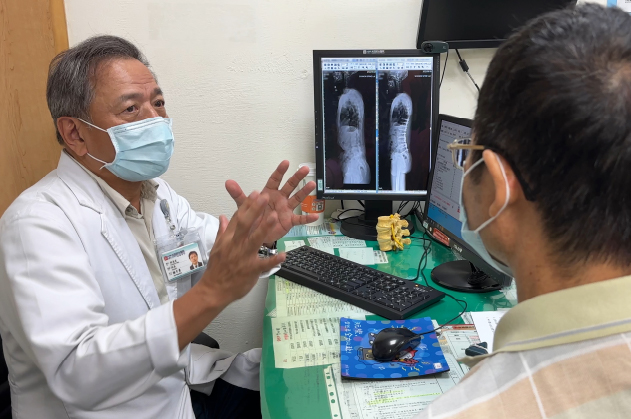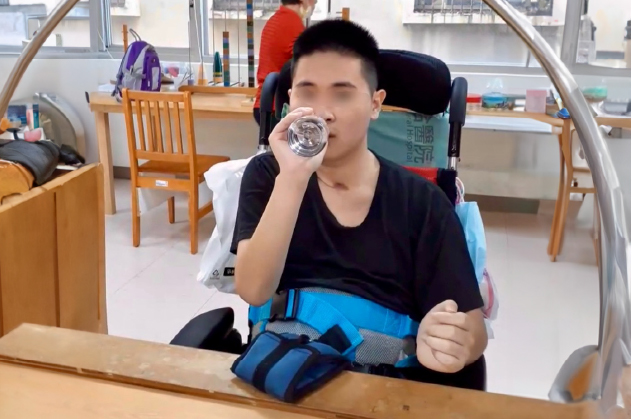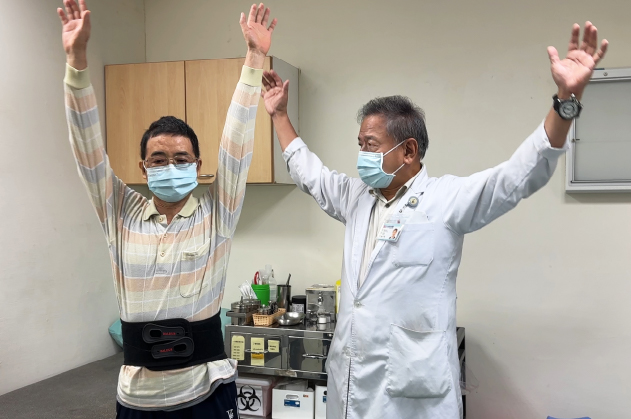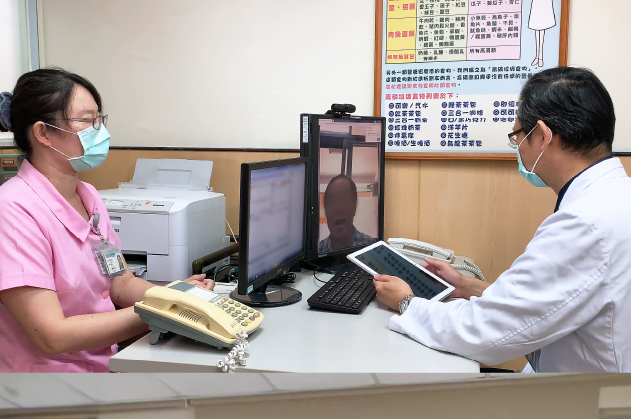
Dr. Tzu-Yung Chen, Superintendent of Kuang Tien General Hospital, is a distinguished neurosurgeon with years of experience in spinal surgery (Photo by KTGH)
In 2022, 18-year-old Mr. Chen, following a car accident that resulted in the complete fracture of spinal segments 5 and 6, underwent a C5 bilateral vertebral body excision and intervertebral disc excision fusion surgery. After six months, he sought treatment at Kuang Tien General Hospital (KTGH), where he received autologous mesenchymal stem cell (MSCs) therapy. Within a week post-surgery, he regained extension and rotation in his arms, and his palms gradually opened. After three intrathecal injections, he started to regain sensation in his fingers.
"At the beginning, Mr. Chen could only use the joint of his thumb to touch the phone screen. After a few weeks of cell therapy, he could already put on a mask independently, indicating the return of finger movement. Progressing further, he could pick up a cup and drink water, and eventually, he started using a spoon and fork for eating," explained by Superintendent Tzu-Yung Chen.

Mr. Chen went from losing control of his fingers to now holding a glass of water after his MSCs treatment (Photo by KTGH)
Dr. Chen and his team closely monitored the subtle changes in patients' movements post-treatment. Progressing from a lack of sensation and immobility to regaining feeling and flexibility in the fingers, and finally achieving the strength to grasp a cup, signifies the gradual extension of the patient's spinal segments from the 6th to the 7th and 8th. It's the progress made step by step.
Topping the Number of Autologous MSCs Treatment in Taiwan
After the Ministry of Health and Welfare approved the "Regulations Governing the Application or Use of Specific Medical Techniques or Examinations, or Medical Devices," KTGH collaborated with Taiwan Advance Bio-Pharmaceutical Inc. to provide autologous mesenchymal stem cell therapy for patients with spinal cord injuries. The process involves extracting the patient’s mesenchymal stem cells, isolating, multiplying, and infusing back into the blood surrounding the patient’s spinal cord. In March 2023, the hospital reported a significant success—a baseball pitcher paralyzed from the waist down due to a car accident. After eight months of treatment and rehabilitation, he can now confidently use assistive devices, reigniting hope for many spinal injury patients. Patients from Hong Kong have specifically travelled to Taiwan for treatment, including individuals who have been injured for over four years seeking consultation and care.

Dr. Tzu-Yung Chen, a leading neurosurgeon in Taiwan, performed more than 10,000 spinal cord surgeries (Photo by KTGH)
Mr. Lin, 29 years old, who suffered a neck injury and had to undergo the removal of the fourth cervical vertebra due to a car accident. Having lived with the injury for four years, he was initially limited to shrugging his shoulders and experienced abnormal sensations of heat and cold. In May 2023, he underwent MSCs therapy. On the fifth day post-surgery, his left arm began to move independently, and he could slightly lift both left and right hands. Moreover, his response to temperature sensations became more normal, igniting hope for him to regain self-care abilities.
"Post-surgery rehabilitation is crucial; the goal is to empower patients to lead independent lives and alleviate the burden on their families," said Dr. Chen. He emphasized that spinal cord injuries not only affect mobility but can also lead to neurological degradation in the lower body, affecting functions such as digestion and urination. This can result in stiffness, muscle atrophy, and issues like osteoporosis and muscle loss.
Individuals with spinal cord injuries, due to the loss of sensation in the core muscle group, often face challenges in exerting force. However, through coordinated rehabilitation efforts, patients can gradually learn to transfer from bed to wheelchair, stand up from the wheelchair, independently use assistive devices, and even manage activities such as showering and eating without the need for constant family assistance. "Our efforts not only helped individual patients, but also extended to the patient’s entire family", Dr. Chen added.
Regaining Mobility Through Post-Surgery Rehabilitation
"The surgery itself is not the challenge". With a cumulative experience of over ten thousand spinal surgeries and the distinction of being the first in Central Taiwan to use the Renaissance Spina Robotic Arm System for surgery - having performed over 1,000 procedures - he leads the world in the number of surgeries of this kind. In his view, when a medical condition meets the criteria for surgery, the spinal procedure itself is not the most important aspect. The critical factors are often "post-operative care" and "rehabilitation".

Kuang Tien General Hospital provides post-operative care and rehabilitation for patients (Photo by KTGH)
In order to enhance the overall efficiency of healthcare professionals and satisfaction levels of spinal patients, KTGH has integrated preoperative, intraoperative, and postoperative procedures, creating a distinctive care workflow. This includes preoperative screening for those at high risk of spinal disorders, offering a comprehensive assessment of osteoporosis. Physicians communicate with patients and their families about the treatment approach.
During surgery, an electronic mobile monitoring system is employed to enhance diagnostic safety and speed, incorporating patient education such as pressure sore prevention, cold therapy, and simplified muscle strength exercises, achieving an impressive satisfaction rate of over 85% in rehabilitation education. The hospital was accredited with the Symbol of National Quality (SNQ) in 2017 for its “Seamless Healthcare- Spinal Surgery Integrated Care”.
O2O Integration and AI Nurses Ensuring Seamless Care
Pioneered by the Department of Information Technology of KTGH, the integration of online and offline (O2O) service models allows patients to record their treatment processes through an app even after returning home from the hospital. They can access various educational resources until their next hospital visit when physicians can thoroughly review the patient's home treatment records and decide whether to adjust the treatment plan.
Taking peritoneal dialysis as an example, patients at home can document the peritoneal dialysis process and order dialysis fluid. When needed, nursing staff can use the built-in video function of the peritoneal dialysis case management system to understand the patient's condition, consistently record detailed information about the patient's status at home. This approach makes it easier to grasp the patient's condition upon returning to the hospital.
Deputy superintendent Chia-Chu Chang described this as the Ministry of Health and Welfare's promotion of "home hospitalization." Even when patients return home, through real-time data integration, they have access to care resources just as if they were in the hospital, enjoying continuous healthcare support.

O2O integration allows seamless care for discharged patients (Photo by KTGH)
The application of technology not only enhances surgical precision, comprehensive care, and the ultimate potential of medical treatment but also addresses the current nurse shortage issue faced nationwide. Due to the immense clinical workload burden on nurses, the IT Department has developed an AI nurse to assist in documenting medical records. Through nurse narrative notes, AI automatically generates nursing records, significantly reducing the time nurses spend on paperwork and allowing them to allocate more time to clinical care.
For the latest therapies in spinal cord injuries, such as autologous mesenchymal stem cell treatment, and insights into how AI nurses can aid in medical record-keeping, further details will be provided during the Healthcare+ Expo.
B2B Opportunities with Kuang Tien General Hospital
AI in Healthcare
| Products/Solutions | Partnership wanted |
|---|---|
| AI Nurses - AI automatically generates nursing records, reducing the paperwork time for nurses | Product implementation; product development |
New and About
| Products/Solutions | Partnership wanted |
|---|---|
| MSCs treatment for spinal cord injury | International medical service agents |
Kuang Tien General Hospital at Healthcare+ Expo 2023
- Thursday, 30 November to Sunday, 3 December
- Booth No. K502 | 1F, TaiNEX 1
